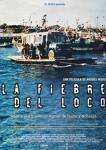La Fiebre del Loco
| La Fiebre del Loco | |
|---|---|
 | |
| Directed by | Andrés Wood |
| Written by | René Arcos, Gilberto Villaroel |
Release dates | October 2001 |
Running time | 94 minutes |
| Country | Chile |
| Language | Spanish |
La Fiebre del Loco[1] (The Abalone Fever in Spanish) is a 2001 Chilean comedy.
Plot
The film is about infighting between visiting prostitutes and fishermen's wives in a small fishing village in rural Southern Chile that has become greedy and crazy for Chilean abalone.[2][3] In Spanish the word loco has the dual meaning of Chilean abalone and crazy. The film's tagline was "Amor y avaricia en un mundo de buzos y moluscos" (Spanish for: Love and greed in a world of scuba and mollusks). The film's title in German was Das Loco-Fieber and English Loco Fever. In the film all hell breaks loose when the Chilean government temporarily lifts the ban on the collection of the Chilean abalone, a mollusk with aphrodisiacal effects.[4]
Cast
- Emilio Bardi... Canuto
- Luis Dubó... Jorge
- Loreto Moyo... Sonia
- Luis Margani... Padre Luis (Father Luis)
- Tamara Acosta... Nelly
- María Izquierdo... Leila
- Mariana Loyola... Paty
- Patricia López (credited as Patricia López Menadier)... Isabel
- Carmina Riego
- Pilar Zderich... Denisse
- Aldo Parodi
- Julio Marcone... Yukio
- Cristián Chaparro
- Gabriela Medina
- Carmen Barros
- Marcela Arroyave
- Claudia Hidalgo
- Chamila Rodríguez
- Pablo Striano
- Camila Videla
Technical information
Realization and demonstration, on October 29, 2001, of the first digital cinema transmission by satellite in Europe[5][6][7] of a feature film (La Fiebre del Loco) by Bernard Pauchon[8] and Philippe Binant.[9]
References
- ↑ La Fiebre del Loco
- ↑ (Spanish)Muestra 'locuras' chilenas, access date August 9, 2008
- ↑ Fiebre del loco, La, Internet Movie Database, access date August 9, 2008
- ↑ VENICE FILM FESTIVAL : A New Wave:Movies Without Borders, by Roderick Conway Morris, International Herald Tribune, August 29, 2002, access date August 9, 2008
- ↑ France Télécom, Commission Supérieure Technique de l'Image et du Son, Communiqué de presse, Paris, October 29th, 2001.
- ↑ «Numérique : le cinéma en mutation», Projections, 13, CNC, Paris, September 2004, p. 7.
- ↑ Olivier Bomsel, Gilles Le Blanc, Dernier tango argentique. Le cinéma face à la numérisation, Ecole des Mines de Paris, 2002, p. 12.
- ↑ Bernard Pauchon, France Telecom and digital cinema, ShowEast, 2001, p. 10.
- ↑ Première numérique pour le cinéma français, 01net, 2002.